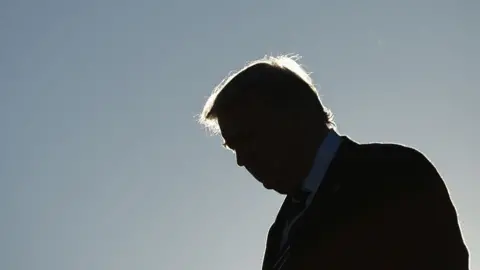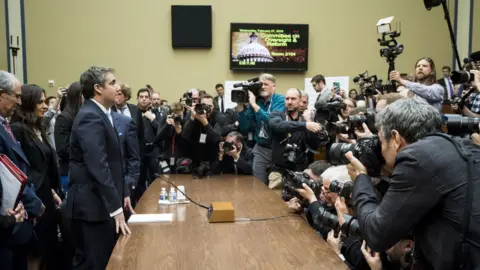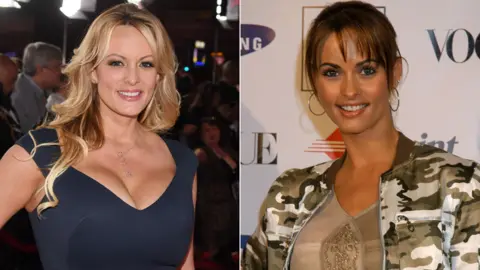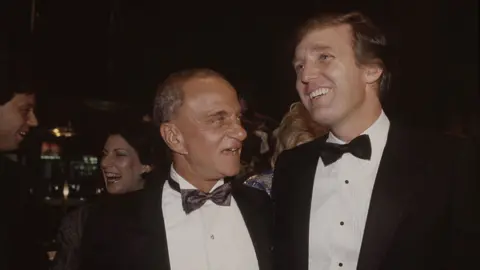Viewpoint: Trump's biggest legal headache might not be Mueller
 Getty Images
Getty ImagesPresident Donald Trump's former lawyer has made a series of allegations about his former boss. Politically embarrassing, yes. But how much legal jeopardy? Jonathan Turley, professor of constitutional law at George Washington University, gives his view.
"Let me... introduce myself."
Those words by Michael Cohen may have been the least needed portion of his testimony. He is truly a man who needs no introduction.
What he needs is a reputation. Well, a good reputation anyway.
Trump's fixer was appearing less than 24 hours after being disbarred as a lawyer and a few weeks before he goes to jail for three years.
So, let's look at the messenger
While Cohen tried to portray himself as the redemptive sinner, few who knew Cohen bought the act. Cohen is a serial liar and thug-for-hire whose lack of legal skill was only surpassed by his lack of legal ethics.
His testimony seemed to flail madly in every direction. He called Trump "a racist", "a conman," and "a cheat".
He was eager to recount how Trump lied about bone spurs to get out of Vietnam. He then reminded everyone that Trump attacked a real war hero, John McCain, for getting captured. He worked in how Trump got him to lie to the First Lady about his affairs.
It was riveting but largely irrelevant to the criminal allegations.
The Republicans and the White House worked hard to establish the obvious - that Cohen is a convicted perjurer and con man.
The evidence
Cohen is no daisy but he can still be a danger. He brought documents, including cheques signed by Trump, to bolster his claims of a pattern of criminal and dishonest practices.
Virtually all of these allegations were far removed from the collusion allegations that led to the special counsel investigation and concerned Trump's businesses.
Most of the examples that Cohen gave of Trump lying about his affairs or wealth or dealings were gratuitous and immaterial to criminal charges.
It is not a crime to lie to the public or the media. If it were, most of the members of the committee would be serving time next to Trump.
 Getty Images
Getty ImagesThe WikiLeaks connection
One disclosure described as a "bombshell" was Cohen recounting that he heard Trump confidante Roger Stone tell Trump over the phone that he had spoken to WikiLeaks founder Julian Assange and that WikiLeaks was about to dump a massive number of hacked emails related to Hillary Clinton and her campaign.
Stone and WikiLeaks deny this account. However, the real problem is the date. Cohen said that this occurred just before the Democratic National Convention. That would put the call from mid- to late July 2016. However, WikiLeaks was already known to have the emails and was publicly teasing their release at least a month before.
Moreover, there is nothing criminal in Stone or Trump wanting to see the emails or relishing their release. Cohen's account of Trump's delight at the news is hardly surprising - he publicly called on the Russians to release any hacked emails.
Moreover, Trump was not the only one seeking dirt from foreign sources. While the campaign falsely denied funding the controversial "Steele dossier", Clinton's campaign later admitted that it paid a former British spy to gather information on Trump from foreign sources, including Russian intelligence.
Indeed, Cohen expressly said that he had no evidence of collusion with the Russians.
The hush money
Cohen also repeated his allegation that Trump encouraged him to arrange for the payment of hush money to a Playboy model and a porn star to bury news of his affairs.
 Getty Images
Getty ImagesCohen showed up bearing cheques with Trump's signature - signed when he was president and still denying prior knowledge of the payments.
This could amount to a campaign finance violation, but such violations are rarely charged as criminal matters and have had mixed success in prosecutions.
The inflated assets
Where Cohen may have caused new problems for Trump was his accounting of dishonest business practices from using his charity to pay portraits of himself for his own benefit or misrepresenting assets in communications with insurance companies and banks.
This included a curious series of asset reports that Cohen said were given to Deutsche Bank in a move to acquire the Buffalo Bills NFL team.
Trump's stated value seemed to jump from $4.56bn in 2012 to $8.66bn in 2013.
It is not clear what that asset increase was based on and whether the figures were put into any formal loan documents. However, any misrepresentation of wealth and liabilities can form the basis of bank fraud allegations.
What is clear is that Trump is looking at a growing threat not from the special counsel's investigation into Russian collusion, but the investigation into his business practices by the US Attorney in the Southern District of New York.
And attacking Cohen's lack of credibility will not change bank records.
From Cohn to Cohen
Trump has been quoted about his respect for Roy Cohn, who was the right-hand man to Joe McCarthy during the "Red Scare" period. He was widely viewed as an unethical and vile human being. He was also Trump's lawyer.
In March 2016, Trump reportedly asked in frustration: "Where's my Roy Cohn?" That man would prove to be Michael Cohen who had the same sense of freedom from rules of ethics or law.
Like Cohn, Cohen was known to threaten and bully people into submission. Like Cohn, Cohen would be disbarred for his unethical acts.
 Getty Images
Getty ImagesMany believe that Cohn was the person who taught Trump to never admit fault and always counterpunch. Cohn once said: "I bring out the worst in my enemies and that's how I get them to defeat themselves."
In the end, Cohn died a disbarred lawyer being pursued by the IRS for millions. Cohen is now a disbarred lawyer who is going to prison for, among other things, five counts of tax evasion.
Of course, Trump has no need to ask "where's my Michael Cohen" in the coming months. He will be in the federal penitentiary.
And the I-word
After the hearing in the House Oversight Committee, Democratic Chairman Elijah Cummings stated that he now believes that Trump not only committed crimes but "it appears that [Trump] did" commit crimes in office.
If true, Trump may be not only looking at a political push for impeachment proceedings in the House of Representatives.
But criminal charges after he leaves office.
Jonathan Turley is the Shapiro Professor of Public Interest Law at George Washington University and served as the last lead defence counsel in an impeachment in the US Senate
